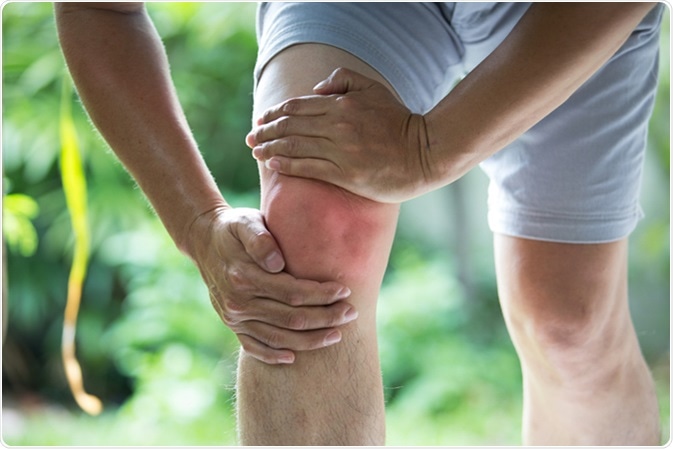Osteoarthritis (OA) is a painful condition of the joints in which the patient suffers from reduced joint mobility due to changes in the joint structure. Formerly, it was thought that OA was mostly due to excessive wear and tear on the joint cartilage because of overuse or too much strain. New research findings indicate a more complex phenomenon surrounding osteoarthritis.

Image Credit: Poylock19 / Shutterstock
Etiological Factors in Osteoarthritis
As OA has a complex etiology, several phenotypes of OA have been described.
Post-Traumatic Osteoarthritis
This form of OA develops following an injury to joints such as hip, knee, and ankle and is responsible for about 12% of all cases of OA. The injury produces progressive cartilage damage leading to altered joint function that in turn increases joint stress and cartilage breakdown. It is more common in long-term injury or when the person is overweight.
In post-traumatic OA, the initial change that happens depends on the severity of the injury. Low-intensity trauma without bone fractures usually lead to damage to the articular surface only. In case of high-intensity trauma, there is cartilage swelling with rupture of collagen and loss of glycosaminoglycans (GAG). GAG loss can lead to cell necrosis that reduces the cells ability to repair or regenerate. This paves way for haemarthrosis. Haemarthrosis plays a crucial role in the pathogenesis of post-traumatic OA causing intra-articular bleeding and synovial hypertrophy that leads to synovitis and further cartilage damage.
Genetic Osteoarthritis
There is a strong genetic contribution to the pathogenesis of OA, but this is also influenced by environmental factors such as obesity and stress, or work type. Most of the candidate genes affect cartilage and bone formation. In most cases, multi-gene variations build up in the individual to produce a higher risk of OA.
Among the many gene interactions, the gene that codes for proteins responsible for the structural integrity of the cartilage matrix (COL2A1) is highly susceptible to this disease. Alteration to this gene hastens joint degeneration in OA.
Age-Related Osteoarthritis
Besides wear and tear on the joint cartilage, other factors that are likely to hasten the development of OA are:
- age-related changes in cartilage matrix secretion
- increased secretion of inflammatory cytokines and decreased production of repair proteins and mediators
- the decreased responsiveness of ageing chondrocytes to growth factor stimulation
- the accumulation of advanced glycation end products (AGEs) leading to cumulative deterioration of joint cartilage
- oxidative stress coupled with mitochondrial dysfunction
- epigenetic changes
Metabolic Osteoarthritis
Triggers of metabolic OA are mostly related to the presence of metabolic syndrome or obesity. Several triggers may act together to produce a condition called meta-inflammation. Some components that trigger OA due to meta-inflammation are:
Changes in the Composition of Body Fat and Carbohydrate
Increased body fat leads to increased load on the knee causing increased damage to the knee joint cartilage. Along with this mechanical effect, excess nutrition leads to hyper-metabolism that is also the primary cause of metabolic syndrome and obesity.
Compared to body mass index (BMI), body fat composition can predict the occurrence of OA when coupled with radiographic evidence. The peroxidation of lipids in the cartilage or synovial cells of the knee joint may lead to oxidation of the cartilage matrix protein and its subsequent degeneration. Research has demonstrated that fat cells promote the dysregulation of cartilage homeostasis that underlies OA in obesity and diabetes, as they produce a wide range of cytokines, adipokines, and acute phase reactants.
Inflammatory Chemicals
Pro-inflammatory and pro-catabolic factors such as adipokines induce inflammation and breakdown of cells. Adipokines such as leptin, visfatin and resistin increase the loss of knee cartilage. Leptin is a small polypeptide synthesized in fat cells that regulates energy homeostasis and correlates positively with fat mass in OA patients. It also promotes inflammation via iNOS, cyclo-oxygenase-2 and interleukins IL-6 and IL-8. In addition, it induces cartilage breakdown via matrix metalloproteinase (MMP) production. The OA-promoting effects of leptin may be differentially enhanced in women.
Cytokines such as interleukin (IL)-6, IL-17, IL-18, and tumor necrosis factor-alpha (TNF-α) that are released from adipose tissues or local inflamed tissues also increase the cartilage loss leading to knee pain.
Acute Phase Reactants
Acute phase reactants such as complement activation by some inflammatory mediators and C-reactive protein (CRP) are also associated with loss of knee cartilage.
Oxidative Stress
Along with obesity, metabolic syndrome also causes chemical changes that lead to increased oxidation. The elevated levels of reactive nitrogen and oxygen species are contributing factors to cartilage damage. Oxidative stress lowers the levels of vitamin D levels that further worsen knee osteoarthritis.
Nutritional Factors
Deficiency in long chain omega-3, polyunsaturated fatty acids (PUFAs) s) can lead to post-traumatic OA, as these molecules reduce the level of inflammatory cytokines and reactive oxygen species. Presence of high levels of saturated fatty acids increases the severity of OA.
High blood sugar level is also an independent risk factor for OA. Hyperglycemia can trigger a low-grade systemic inflammation that increases the rate of progression of OA because of increased oxidative stress and advanced glycation products (AGEs).
Management of Osteoarthritis
Adiponectin has an anti-inflammatory effect that may benefit OA. IL-10 is another anti-inflammatory agent that can be used to treated metabolically triggered inflammation.
The metabolic imbalance that occurs with surplus nutrition is due to abnormally high and disproportional blood lipid levels and impaired glucose tolerance. Dyslipidemia causes fat accumulation in the cartilage resulting in OA-associated changes. Prescribing high doses of statins can reduce the risk of OA.
Conclusion
The ability to detect some of the triggers of this painful and potentially crippling condition is important for developing sound preventive and therapeutic measures. Therapeutic intervention should aim at relieving the pain associated with OA and other OA symptoms along with arrest or slowing down of OA progression.
Further Reading
Last Updated: Feb 27, 2019